With the Night Mail (9)
By:
May 16, 2012
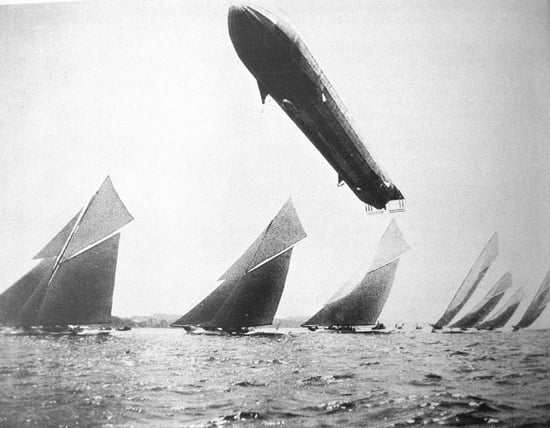
HILOBROW is pleased to present the ninth installment of our serialization of Rudyard Kipling’s With the Night Mail (and his follow-up story, “As Easy as A.B.C.”). New installments will appear each Wednesday for 12 weeks.
With the Night Mail follows the exploits of an intercontinental mail dirigible battling the perfect storm. Between London and Quebec we learn that a planet-wide Aerial Board of Control (A.B.C.) now enforces a technocratic system of command and control not only in the skies but in world affairs, too. A follow-up story, “As Easy As A.B.C.,” recounts what happens when agitators in Chicago demand a return of democracy: The A.B.C. sends zeppelins armed with sound weapons to subdue not the agitators, but a mob who would destroy them! With the Night Mail is set in 2000, and it first appeared in 1905; 2012 marks the centennial of the first publication of “As Easy As A.B.C.”
In June, HiLoBooks will publish a beautiful new edition of With the Night Mail (and “As Easy as A.B.C.”), checked against the 1909 first published edition (Doubleday), with an Introduction by science fiction author Matthew De Abaitua, and an Afterword by science fiction author Bruce Sterling. SUPPLIES ARE LIMITED! CLICK HERE TO ORDER YOUR COPY.
SUBSCRIBE to HILOBROW’s serialized fiction via RSS.
LAST WEEK: “One knows vaguely that there is such a thing as a Fleet somewhere on the Planet, and that, theoretically, it exists for the purposes of what used to be known as ‘war.’ Only a week before, while visiting a glacier sanatorium behind Gothaven, I had seen some squadrons making false auroras far to the north while they manoeuvred round the Pole; but, naturally, it had never occurred to me that the things could be used in earnest.”
ALL EXCERPTS: 1 | 2 | 3 | 4 | 5 | 6 | 7 | 8 | 9 | 10 | 11 | 12
‘The Board hasn’t shown what you might call a fat spark on this occasion,’ said De Forest, wiping his eyes. ‘I hope I didn’t look as big a fool as you did, Arnott! Hullo! What on earth is that? Dad coming home from Chicago?’
There was a rattle and a rush, and a five-plough cultivator, blades in air like so many teeth, trundled itself at us round the edge of the timber, fuming and sparking furiously.
‘Jump!’ said Arnott, as we hurled ourselves through the none-too-wide door. ‘Never mind about shutting it. Up!’
The Victor Pirolo lifted like a bubble, and the vicious machine shot just underneath us, clawing high as it passed.
‘There’s a nice little spit-kitten for you!’ said Arnott, dusting his knees. ‘We ask her a civil question. First she circuits us and then she plays a cultivator at us!’
‘And then we fly,’ said Dragomirof. If I were forty years more young, I would go back and kiss her. Ho! Ho!’
‘I,’ said Pirolo, ‘would smack her! My pet ship has been chased by a dirty plough; a — how do you say?— agricultural implement.’
‘Oh, that is Illinois all over,’ said De Forest. ‘They don’t content themselves with talking about privacy. They arrange to have it. And now, where’s your alleged fleet, Arnott? We must assert ourselves against this wench.’
Arnott pointed to the black heavens. ‘Waiting on — up there,’ said he. ‘Shall I give them the whole installation, sir?’
‘Oh, I don’t think the young lady is quite worth that,’ said De Forest. ‘Get over Chicago, and perhaps we’ll see something.’
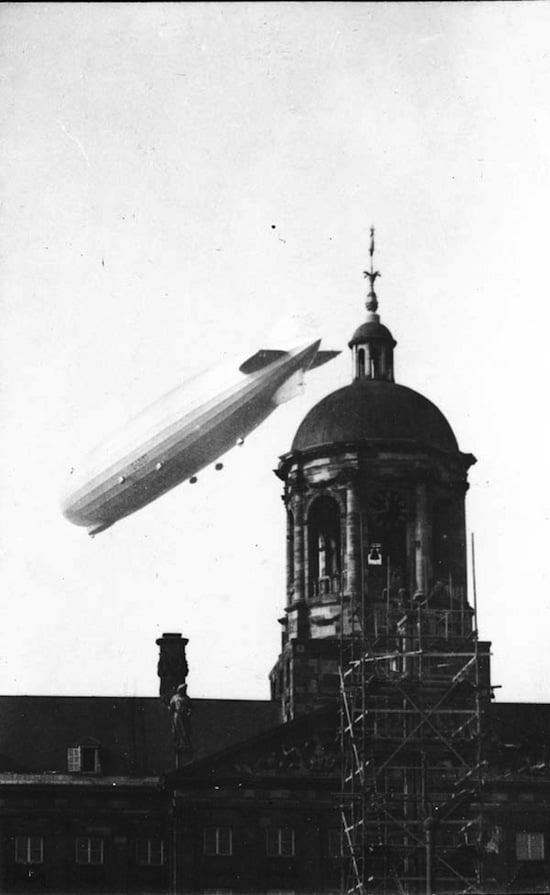
In a few minutes we were hanging at two thousand feet over an oblong block of incandescence in the centre of the little town.
‘That looks like the old City Hall. Yes, there’s Salati’s Statue in front of it,’ said Takahira.
‘But what on earth are they doing to the place? I thought they used it for a market nowadays! Drop a little, please.’
We could hear the sputter and crackle of road-surfacing machines — the cheap Western type which fuse stone and rubbish into lava-like ribbed glass for their rough country roads. Three or four surfacers worked on each side of a square of ruins. The brick and stone wreckage crumbled, slid forward, and presently spread out into white-hot pools of sticky slag, which the levelling-rods smoothed more or less flat. Already a third of the big block had been so treated, and was cooling to dull red before our astonished eyes.
‘It is the Old Market,’ said De Forest. ‘Well, there’s nothing to prevent Illinois from making a road through a market. It doesn’t interfere with traffic, that I can see.’
‘Hsh!’ said Arnott, gripping me by the shoulder. ‘Listen! They’re singing. Why on the earth are they singing?’
We dropped again till we could see the black fringe of people at the edge of that glowing square.
At first they only roared against the roar of the surfacers and levellers. Then the words came up clearly — the words of the Forbidden Song that all men knew, and none let pass their lips — poor Pat MacDonough’s Song, made in the days of the Crowds and the Plague — every silly word of it loaded to sparking-point with the Planet’s inherited memories of horror, panic, fear and cruelty. And Chicago — innocent, contented little Chicago — was singing it aloud to the infernal tune that carried riot, pestilence and lunacy round our Planet a few generations ago!
‘Once there was The People —Terror gave it birth;
Once there was The People, and it made a hell of earth!’
(Then the stamp and pause):
‘Earth arose and crushed it. Listen, oh, ye slain!
Once there was The People — it shall never be again!’
The levellers thrust in savagely against the ruins as the song renewed itself again, again and again, louder than the crash of the melting walls.
De Forest frowned.
I don’t like that,’ he said. ‘They’ve broken back to the Old Days! They’ll be killing somebody soon. I think we’d better divert ’em, Arnott.’
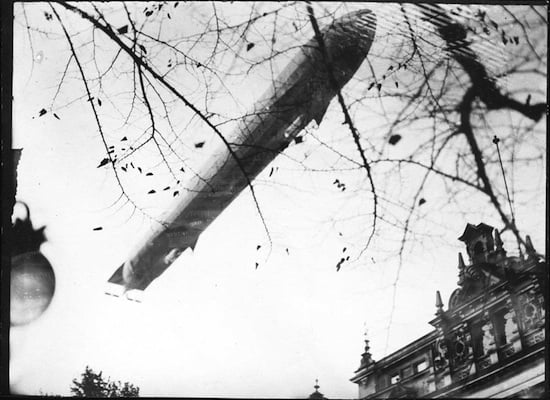
‘Ay, ay, sir.’ Arnott’s hand went to his cap, and we heard the hull of the Victor Pirolo ring to the command: ‘Lamps! Both watches stand by! Lamps! Lamps! Lamps!’
‘Keep still!’ Takahira whispered to me. ‘Blinkers, please, quartermaster.’
‘It’s all right — all right!’ said Pirolo from behind, and to my horror slipped over my head some sort of rubber helmet that locked with a snap. I could feel thick colloid bosses before my eyes, but I stood in absolute darkness.
‘To save the sight,’ he explained, and pushed me on to the chart-room divan. ‘You will see in a minute.’
As he spoke I became aware of a thin thread of almost intolerable light, let down from heaven at an immense distance — one vertical hair’s breadth of frozen lightning.
‘Those are our flanking ships,’ said Arnott at my elbow. ‘That one is over Galena. Look south — that other one’s over Keithburg. Vincennes is behind us, and north yonder is Winthrop Woods. The Fleet’s in position, sir’— this to De Forest. ‘As soon as you give the word.’
‘Ah no! No!’ cried Dragomiroff at my side. I could feel the old man tremble. ‘I do not know all that you can do, but be kind! I ask you to be a little kind to them below! This is horrible horrible!’
‘”When a Woman kills a Chicken,/Dynasties and Empires sicken,”‘ Takahira quoted. ‘It is too late to be gentle now.’
‘Then take off my helmet! Take off my helmet!’ Dragomiroff began hysterically.
Pirolo must have put his arm round him.
‘Hush,’ he said, ‘I am here. It is all right, Ivan, my dear fellow.’
‘I’ll just send our little girl in Bureau County a warning,’ said Arnott. ‘She don’t deserve it, but we’ll allow her a minute or two to take mamma to the cellar.’
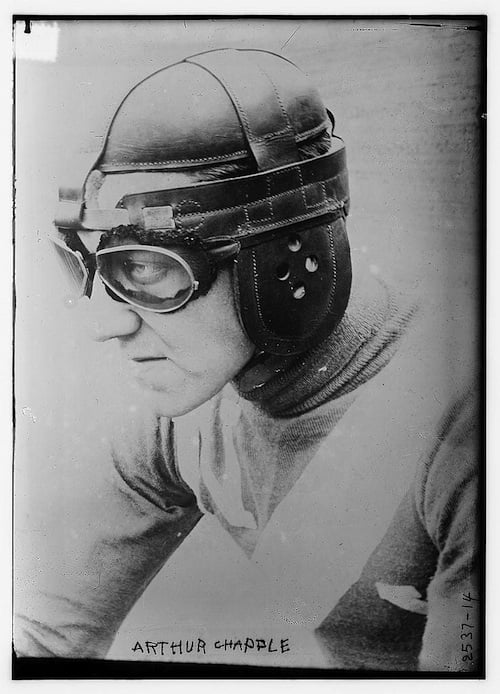
In the utter hush that followed the growling spark after Arnott had linked up his Service Communicator with the invisible Fleet, we heard “MacDonough’s Song” from the city beneath us grow fainter as we rose to position. Then I clapped my hand before my mask lenses, for it was as though the floor of Heaven had been riddled and all the inconceivable blaze of suns in the making was poured through the manholes.
‘You needn’t count,’ said Arnott. I had had no thought of such a thing. ‘There are two hundred and fifty keels up there, five miles apart. Full power, please, for another twelve seconds.’
The firmament, as far as eye could reach, stood on pillars of white fire. One fell on the glowing square at Chicago, and turned it black.
‘Oh! Oh! Oh! Can men be allowed to do such things?’ Dragomiroff cried, and fell across our knees.
‘Glass of water, please,’ said Takahira to a helmeted shape that leaped forward. ‘He is a little faint.’
The lights switched off, and the darkness stunned like an avalanche. We could hear Dragomiroff’s teeth on the glass edge.
Pirolo was comforting him.
‘All right, all ra-ight,’ he repeated. ‘Come and lie down. Come below and take off your mask. I give you my word, old friend, it is all right. They are my siege-lights. Little Victor Pirolo’s leetle lights. You know me! I do not hurt people.’
‘Pardon!’ Dragomiroff moaned. ‘I have never seen Death. I have never seen the Board take action. Shall we go down and burn them alive, or is that already done?’
‘Oh, hush,’ said Pirolo, and I think he rocked him in his arms.
‘Do we repeat, sir?’ Arnott asked De Forest.
‘Give ’em a minute’s break,’ De Forest replied.’ They may need it.’
We waited a minute, and then “MacDonough’s Song,” broken but defiant, rose from undefeated Chicago.
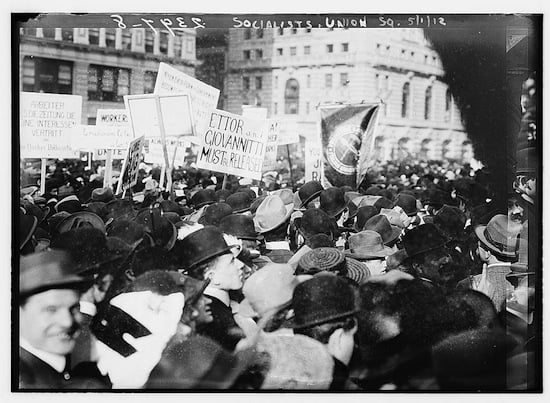
‘They seem fond of that tune,’ said De Forest. ‘I should let ’em have it, Arnott.’
‘Very good, sir,’ said Arnott, and felt his way to the Communicator keys.
No lights broke forth, but the hollow of the skies made herself the mouth for one note that touched the raw fibre of the brain. Men hear such sounds in delirium, advancing like tides from horizons beyond the ruled foreshores of space.
‘That’s our pitch-pipe,’ said Arnott. ‘We may be a bit ragged. I’ve never conducted two hundred and fifty performers before.’ He pulled out the couplers, and struck a full chord on the Service Communicators.
The beams of light leaped down again, and danced, solemnly and awfully, a stilt-dance, sweeping thirty or forty miles left and right at each stiff-legged kick, while the darkness delivered itself — there is no scale to measure against that utterance — of the tune to which they kept time. Certain notes — one learnt to expect them with terror — cut through one’s marrow, but, after three minutes, thought and emotion passed in indescribable agony.
We saw, we heard, but I think we were in some sort swooning. The two hundred and fifty beams shifted, re-formed, straddled and split, narrowed, widened, rippled in ribbons, broke into a thousand white-hot parallel lines, melted and revolved in interwoven rings like old-fashioned engine-turning, flung up to the zenith, made as if to descend and renew the torment, halted at the last instant, twizzled insanely round the horizon, and vanished, to bring back for the hundredth time darkness more shattering than their instantly renewed light over all Illinois. Then the tune and lights ceased together, and we heard one single devastating wail that shook all the horizon as a rubbed wet finger shakes the rim of a bowl.
‘Ah, that is my new siren,’ said Pirolo. ‘You can break an iceberg in half, if you find the proper pitch. They will whistle by squadrons now. It is the wind through pierced shutters in the bows.’
I had collapsed beside Dragomiroff, broken and snivelling feebly, because I had been delivered before my time to all the terrors of Judgment Day, and the Archangels of the Resurrection were hailing me naked across the Universe to the sound of the music of the spheres.
Then I saw De Forest smacking Arnott’s helmet with his open hand. The wailing died down in a long shriek as a black shadow swooped past us, and returned to her place above the lower clouds.
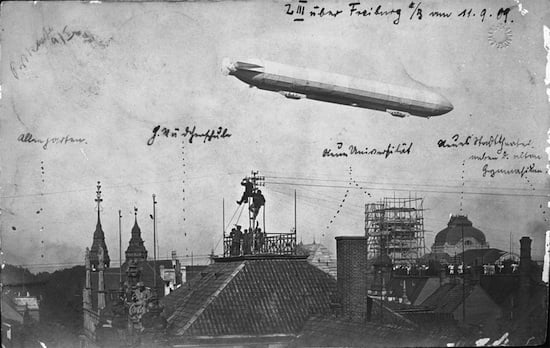
‘I hate to interrupt a specialist when he’s enjoying himself,’ said De Forest. ‘But, as a matter of fact, all Illinois has been asking us to stop for these last fifteen seconds.’
‘What a pity.’ Arnott slipped off his mask. ‘I wanted you to hear us really hum. Our lower C can lift street-paving.’
‘It is Hell —Hell!’ cried Dragomiroff, and sobbed aloud.
Arnott looked away as he answered: ‘It’s a few thousand volts ahead of the old shoot-’em-and-sink-’em game, but I should scarcely call it that. What shall I tell the Fleet, sir?’
‘Tell ’em we’re very pleased and impressed. I don’t think they need wait on any longer. There isn’t a spark left down there.’ De Forest pointed. ‘They’ll be deaf and blind.’
‘Oh, I think not, sir. The demonstration lasted less than ten minutes.’
‘Marvellous!’ Takahira sighed. ‘I should have said it was half a night. Now, shall we go down and pick up the pieces?’
‘But first a small drink,’ said Pirolo. ‘The Board must not arrive weeping at its own works.’
‘I am an old fool — an old fool!’ Dragomiroff began piteously. ‘I did not know what would happen. It is all new to me. We reason with them in Little Russia.’
NEXT WEEK: “If you’ve ever been ground-circuited,’ said the Mayor, ‘you’ll know it don’t improve any man’s temper to be held up straining against nothing. No, sir! Eight or nine hundred folk kept pawing and buzzing like flies in treacle for two hours, while a pack of perfectly safe Serviles invades their mental and spiritual privacy, may be amusing to watch, but they are not pleasant to handle afterwards.'”
RADIUM AGE SCIENCE FICTION: “Radium Age” is HILOBROW’s name for the 1904–33 era, which saw the discovery of radioactivity, the revelation that matter itself is constantly in movement — a fitting metaphor for the first decades of the 20th century, during which old scientific, religious, political, and social certainties were shattered. This era also saw the publication of genre-shattering writing by Edgar Rice Burroughs, Sax Rohmer, E.E. “Doc” Smith, Jack London, Arthur Conan Doyle, Aldous Huxley, Olaf Stapledon, Karel Čapek, H.P. Lovecraft, Charlotte Perkins Gilman, Yevgeny Zamyatin, Philip Gordon Wylie, and other pioneers of post-Verne/Wells, pre-Golden Age “science fiction.” More info here.
HILOBOOKS: The mission of HiLoBooks is to serialize novels on HiLobrow; and also, as of 2012, operating as an imprint of Richard Nash’s Cursor, to reissue Radium Age science fiction in beautiful new print editions. So far, we have published Jack London’s The Scarlet Plague, Rudyard Kipling’s With the Night Mail (and “As Easy as A.B.C.”), Arthur Conan Doyle’s The Poison Belt, H. Rider Haggard’s When the World Shook, Edward Shanks’s The People of the Ruins, William Hope Hodgson’s The Night Land, and J.D. Beresford’s Goslings. Forthcoming: E.V. Odle’s The Clockwork Man, Cicely Hamilton’s Theodore Savage, and Muriel Jaeger’s The Man with Six Senses. For more information, visit the HiLoBooks homepage.
READ: You are reading Rudyard Kipling’s With the Night Mail and “As Easy As A.B.C.” Also read our serialization of: Jack London’s The Scarlet Plague | H. Rider Haggard’s When The World Shook
ORIGINAL FICTION: HILOBROW has serialized three novels: James Parker’s The Ballad of Cocky The Fox (“a proof-of-concept that serialization can work on the Internet” — The Atlantic) and Karinne Keithley Syers’s Linda Linda Linda. We also publish original stories and comics.
